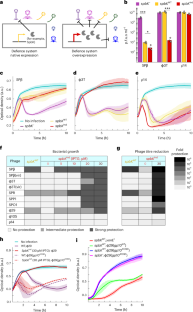Expression level of anti-phage defence systems controls a trade-off between protection range and autoimmunity
IF 19.4
1区 生物学
Q1 MICROBIOLOGY
引用次数: 0
Abstract
The evolutionary arms race between bacteria and phages has given rise to elaborate anti-phage defence mechanisms. Although many of these systems have been characterized at the molecular level, the general principles and constraints at play are underexplored. It is broadly recognized that in addition to the protection they provide, these systems also bear a substantial cost. Here we identify an expression-dependent trade-off between the protection range of defence systems and the fitness burden they impose. We first focus on the SpbK system of Bacillus subtilis and then generalize to other systems across a range of bacteria. We show that increasing expression of defence systems enhances their protection range, and provide evidence that this is achieved by overwhelming phage strategies for circumventing bacterial defence. However, for most systems tested, increased expression also leads to self-inflicted toxicity. This trade-off between protection and autoimmunity may shape the evolution of regulatory strategies and favour the coexistence of multiple systems within a single genome. The authors examine several defense systems and find that increased expression enhances their protection range, albeit at a cost of autoimmunity.


抗噬菌体防御系统的表达水平控制着保护范围和自身免疫之间的权衡
细菌和噬菌体之间的进化军备竞赛已经产生了复杂的抗噬菌体防御机制。虽然这些系统中的许多已经在分子水平上进行了表征,但其一般原理和限制因素尚未得到充分探讨。人们普遍认识到,这些系统除了提供保护外,还需要付出巨大的代价。在这里,我们确定了防御系统的保护范围和它们施加的适应性负担之间的表达依赖权衡。我们首先关注枯草芽孢杆菌的SpbK系统,然后推广到一系列细菌的其他系统。我们表明防御系统表达的增加增强了它们的保护范围,并提供证据表明这是通过压倒性的噬菌体策略来绕过细菌防御来实现的。然而,对于大多数测试的系统,增加的表达也会导致自我造成的毒性。这种保护和自身免疫之间的权衡可能会影响调控策略的进化,并有利于多个系统在单个基因组内共存。
本文章由计算机程序翻译,如有差异,请以英文原文为准。
求助全文
约1分钟内获得全文
求助全文
来源期刊

Nature Microbiology
Immunology and Microbiology-Microbiology
CiteScore
44.40
自引率
1.10%
发文量
226
期刊介绍:
Nature Microbiology aims to cover a comprehensive range of topics related to microorganisms. This includes:
Evolution: The journal is interested in exploring the evolutionary aspects of microorganisms. This may include research on their genetic diversity, adaptation, and speciation over time.
Physiology and cell biology: Nature Microbiology seeks to understand the functions and characteristics of microorganisms at the cellular and physiological levels. This may involve studying their metabolism, growth patterns, and cellular processes.
Interactions: The journal focuses on the interactions microorganisms have with each other, as well as their interactions with hosts or the environment. This encompasses investigations into microbial communities, symbiotic relationships, and microbial responses to different environments.
Societal significance: Nature Microbiology recognizes the societal impact of microorganisms and welcomes studies that explore their practical applications. This may include research on microbial diseases, biotechnology, or environmental remediation.
In summary, Nature Microbiology is interested in research related to the evolution, physiology and cell biology of microorganisms, their interactions, and their societal relevance.
 求助内容:
求助内容: 应助结果提醒方式:
应助结果提醒方式:


